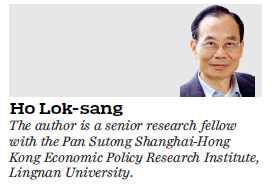Facts clash with lies in discussion of Hong Kong protests
Updated: 2019-09-10 07:32
(HK Edition)
|
|||||||
Pansy Ho Chiu-king, representing the Hong Kong Federation of Women, is due to speak to the United Nations Human Rights Council today (Tuesday). Her statement should be a wake-up call for all those who have been misled by the "agitprop" (propaganda to agitate) campaign waged by the protesters and their supporters in Hong Kong.
She wrote: "In the 22 years since Hong Kong was rightfully returned to its motherland China in 1997 and has been operating under the 'one country, two systems' principle, Hong Kong has continued to enjoy a high degree of autonomy, economic prosperity and social stability."
Testifying to Ho's list of facts, according to the World Bank's authoritative Worldwide Governance Indicators, we witness:
Hong Kong's Control of Corruption ranking rose from the top 10.2 percent in 1996 to the top 7.7 percent in 2017.
Hong Kong's Rule of Law ranking rose from the top 30.1 percent to the top 6.2 percent over the 22 years.
In Voice and Accountability, Hong Kong's ranking dipped slightly, from the top 38 percent to the top 39.4 percent, but the score actually did rise all the same: from +0.33 pre-handover to +0.43 by 2017.
In Political Stability and Absence of Violence, our ranking rose from top 33.0 percent to top 24.7 percent.
In Effective Government, Hong Kong rose from the top 16.4 percent to the top 2.4 percent.
In Regulatory Quality, Hong Kong rose from the top 3.4 percent to the very top spot.

Against this background, Ho noted:
"According to the World Bank, Hong Kong's GDP was $341.4 billion and GDP per capita was $46,193.61 in 2017; the unemployment rate was at 2.8 in 2018; and climbed to No 4 in 2019 on its lists of easiest places to do business, just after New Zealand, Singapore and Denmark. Until two months ago, Hong Kong had been one of the safest places in the world for visitors to visit."
All this is proof that "one country, two systems" has been working fine.
Thus, authoritative data do not depict a Hong Kong that violates human rights, as Denise Ho Wan-see and the protesters in Hong Kong claim. Denise Ho claimed that freedoms in the territory were "under serious attack," and wanted the UN Human Rights Council to remove China from its membership. The fact is, even for the Chinese mainland, the Rule of Law Index ranking had risen noticeably over the same period.
Hong Kong's rapid descent into its current chaotic state was triggered by a controversial bill to bring to justice fugitives who have committed crimes overseas but are seeking refuge in Hong Kong. That bill had met with massive objection, largely as the result of a lack of trust for the mainland's legal system. But the bill was pronounced "dead" on July 9, when Chief Executive Carrie Lam Cheng Yuet-ngor expressly committed herself not to table it again for the rest of her term of office. The protesters then criticized her for not using the term "withdraw." She eventually did that, on Wednesday, but the violence continued. So one would legitimately ask: What do the protesters and their backers really want?
The protesters listed five demands and wanted all five. The first is withdrawing the fugitive-law amendment bill. This has now been granted. The second is setting up a commission to look into possible police misconduct. The third is granting amnesty to those who have been arrested. The fourth is ending the characterization of the protests as riots. The fifth is "double universal suffrage" the way they want it.
The government says that there is a standard procedure for handling complaints against the police, and that is through the Independent Police Complaints Council. Lam has tried to enhance the credibility of the IPCC by inviting additional people, both locally and from around the world, to join the subcommittee under the IPCC. Helen Yu Lai Ching-ping, a former senior civil servant appointed to the subcommittee, said that an independent commission to look into the ins and outs of the entire saga should wait until order returns.
The demand for amnesty for all those arrested during the unrest clearly goes against the rule of law and Hong Kong's core values. The characterization of the protests as "riots" is a non-issue, as whether an arrested person will be convicted for the crime of rioting is up to the courts to decide.
So the only demand that is left is the "double universal suffrage." But according to the Basic Law, which Hong Kong people and Beijing were committed to, election of the chief executive must be based on the list of candidates approved by the Nominating Committee. The fact is that those who want to bypass the Nominating Committee as required by the Basic Law are reneging on the agreement between Hong Kong and Beijing.
There are two kinds of protesters: those who have a hidden political agenda against the Chinese mainland and want every opportunity to subvert its achievements; and those who genuinely harbor fear of the mainland because too many alternative facts are being floated around. The first kind of protesters and their backers will spare no effort in their agitprop activities. Unfortunately, the second kind of protester is at their mercy. It is increasingly clear to me that only decisive actions can stop the fake news and violence and restore order to Hong Kong.
(HK Edition 09/10/2019 page8)